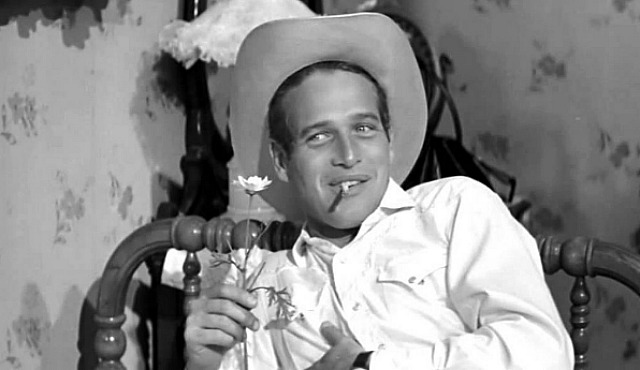We all know what happened with Martin Ritt‘s Hud. Ritt, screenwriters Irving Ravetch and Harriet Frank and Paul Newman wanted audiences to react to the selfish and insensitive Hud Bannon with a mixture of fascination and repulsion — as a symbol of middle-class cynicism and opportunism that was shaping the culture of 1963 America.
Instead audiences (teens especially) found Hud a roguishly charming renegade, and even a half-admirable rascal on a certain level. Newman: “The last thing people would do, we thought, was accept Hud as a heroic character…his amorality just went over their heads…all they saw was this western, heroic individual”.
The bottom line, I think, is that younger audiences weren’t so much delighted with Hud’s caddish behavior as uncomfortable with Melvyn Douglas‘s Homer, a gruff and taciturn voice of old-school morality who constantly frowns at Hud and regards him as rank and poisoned.
Younger audiences interpreted Homer’s admonishments as an echo of their parents and grandparents’ beliefs, which they found stifling to some extent. Hud repped a certain impudent freedom.
Years later Ritt said that kids who saw Hud as some kind of irreverent anti-establishment type were expressing the emerging values of the coming counterculture of the late 1960s.
50 years later the same kind of thing happened with Martin Scorsese‘s The Wolf of Wall Street. Scorsese, screenwriter Terence Winter and Leonardo DiCaprio presented what they believed was a half-comic, half-repugnant satire of Wall Street lunatics and the rancid values of guys like Jordan Belfort — a darkly comic indictment of greed and avarice among the 1%.
Instead a good portion of the audience got a huge kick out of Belfort’s excessive behaviors and ravenous appetites, and those of Jonah Hill‘s Donnie Azoff and the general madman culture of Stratton Oakmont. I remember LexG tweeting back then that he’d enjoyed WoWS for “the wrong reasons.” I had a distinct sense that a lot of people were in the same boat.
What other significant films were supposed to deliver a sobering moral lesson or inspire ethical revulsion, but in the minds of moviegoers wound up providing a kind of debased brand of entertainment?

